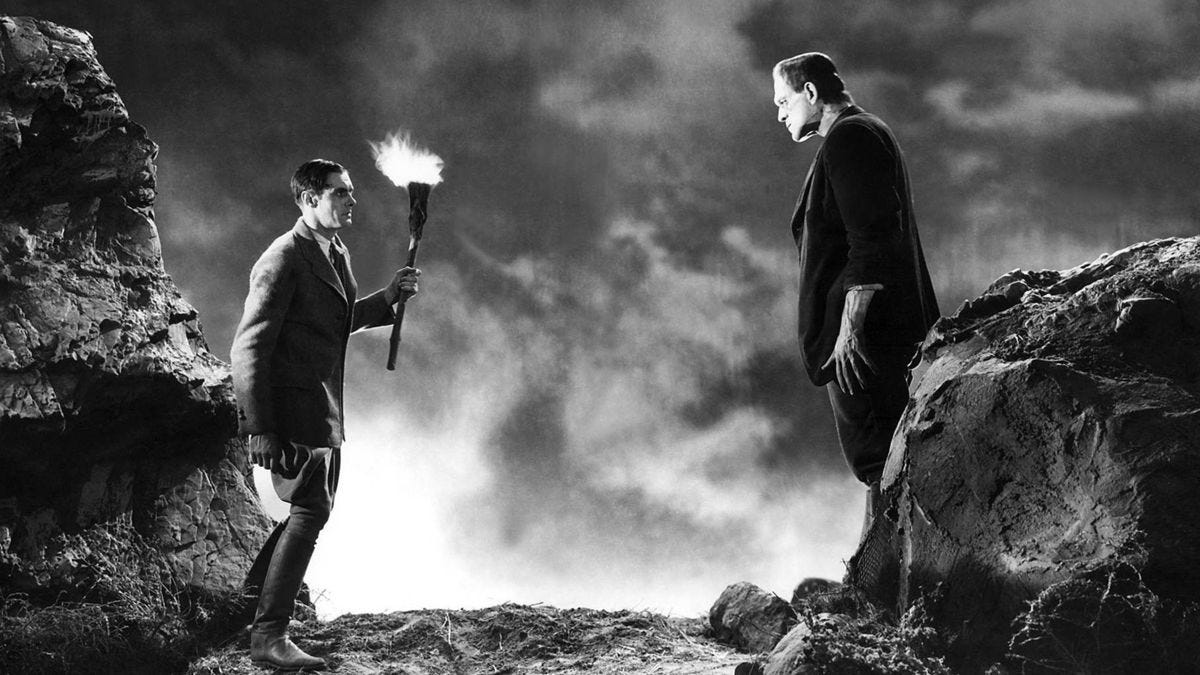The Most Iconic Science Fiction Work Ever
The future has no center
If you had to pick one work, in any medium, to represent the core of science fiction, what would it be?
The answer is obvious. Mary Shelley’s Frankenstein (1818) is widely regarded as the first work of science fiction. The tale of a mad scientist whose meddling with the forces of nature leads to abomination has been hugely influential. Dr. Frankenstein birthed, not just one monster, but all those other mad scientists from Dr. Jekyll to Dr. Doom to Rick Sanchez to many another weaponized doctorate-haver. What is more science fiction than Frankenstein?
There’s one problem. Frankenstein wasn’t initially science fiction at all, because science fiction hadn’t really been invented as a genre. (If it had, Frankenstein couldn’t be the first!) In its own day Frankenstein was seen as a Gothic novel of mystery and terror, what with the reanimated corpses and the grisly murders. It was also connected to the Romantic movement because of its focus on the monster’s intense, unusual inner life. And because Mary Shelley was married to romantic poet guy Percy Shelley.
Even today, a Frankenstein movie is probably going to be marketed as horror, not science fiction. Can a work which wasn’t science fiction at the time and isn’t really science fiction now really be the most iconic science fiction work ever?
There are other plausible candidates for SF icon. H.G. Wells’ novels The Time Machine and The War of the Worlds have been foundational for the central SF subgenres of time travel and alien invasion. Isaac Asimov’s Robot stories have influenced Bladerunner, Westworld, and many another SF property fascinated with the question of just how human those metal helpmates are.
There are problems here too though. Wells’ works, like Mary Shelley’s, weren’t exactly seen as science fiction in their own time. (Wells called his own books “scientific romances.”) As with Shelley, too, you could argue that Wells’ novels are more horror than SF—which is why Orson Welles radio adaptation of The War of the Worlds caused a panic in 1938.
As for Asimov, while he’s very influential, he isn’t much read or discussed these days. If we’re talking about “most iconic” works, that would probably be the thing that comes to mind instantly when you think of science fiction. For most people that’s not going to be a book at all. It’s going to be a movie. Specifically, it’s probably going to be Star Wars.
There’s no question that the Star Wars series is the most successful and popular science fiction work of all time. Adjusted for inflation, the 1977 Star Wars: A New Hope has the second highest box office of all time. The Force Awakens is 11 and The Empire Strikes Back is 13, making the series the only franchise in history to have more than one entry in the 15 top-selling films time. (Avengers: Endgame comes in at 16.) If you ask someone on the street what science fiction films they’ve seen, chances are they’ll mention Star Wars first, last, and maybe a couple of times in the middle.
But! (You knew there would be a “but” at this point.)
Star Wars’ popularity is in part because it’s not just one genre, but all of them. The franchise takes some swash and buckle from Westerns and a lot of old weird wizard stuff from fantasy. It borrows from Japanese Samurai epics too.
The Oxford dictionary says science fiction is “fiction based on imagined future scientific or technological advances and major social or environmental changes….” If that’s right, then Star Wars clearly doesn’t fit at all. It’s not even set in the future, but “long, long ago.”
The Oxford definition isn’t the be-all and end-all of SF genre definitions, though. In fact, there is no be-all and end-all definition. Genres aren’t really created by definitions. They’re glommed together by writers, fans, critics, marketers, and casual passersby over time.
Critic John Rieder argues that genre is a “web of resemblances.” Star Wars has space ships and ray guns. There are space ships and ray guns in other science fiction books, so there’s a resemblance, and you could call it science fiction. Mad scientists have become standard in a lot of science fiction works, and Frankenstein includes a mad scientist. So it can be considered science fiction now, even if the web of resemblances it was a part of when it was created was different.
There isn’t really any one iconic work of science fiction. Rather, “SF” is a term that gets applied to a bunch of works which look like each other in some ways sometimes. Frankenstein, Black Panther, Parable of the Sower, War of the Worlds, The ArchAndroid, Star Wars, Akira, Star Trek, 1984, Ghost in the Shell, and on and on, all define each other. Science fiction doesn’t have a center. The future is everywhere.



Of course, Frankenstein the mad scientist isn't really the main point of Frankenstein the book at all. He's a facilitator for a pretty profound inquiry into what makes a human.
It took a LONG time for the genre of SF to get to the point of making profound inquiries about anything. Now it does all the time, and it is well worth finding and reading the ones that go beyond zap and zing around the galaxy.
When I grew up I read a lot of Jules Vernes. I would say he was an early SF writer. I would also posit that Star Trek is important.